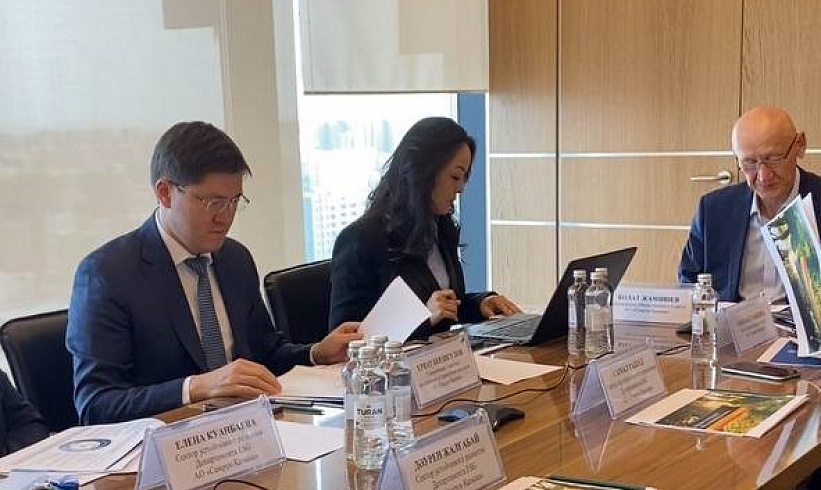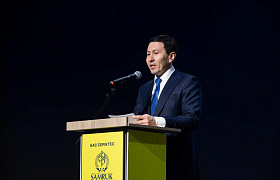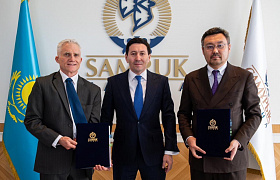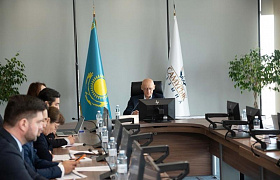Samruk-Kazyna JSC to Have Presented the Low-Carbon Development Concept to the Public

702
12 December 2022
Today, the open meeting of the Public Council of the Fund chaired by Bolat Zhamishev has taken place in Samruk-Kazyna JSC. Yernat Berdigulov, Managing Director, has presented the Low-Carbon Development Concept of the Fund to experts, profile associations, the media and public.
The strategic goal of Samruk-Kazyna JSC until 2032 is to reduce the carbon footprint by 10% as compared to 2021. The long-term goal is to achieve carbon neutrality by the Fund and Portfolio Companies by 2060. The Concept includes the Plan on transition to the low-carbon business model. It provides specific infrastructure projects, best practices and technological solutions in the field of alternative energy and technologies. The Concept meets the global trend to prevent increase in temperature on the planet and will contribute to Kazakhstan achievement of carbon neutrality. In August, the Board of Directors of Samruk-Kazyna JSC has approved the Concept.
The carbon footprint of the Fund group has been calculated
The Fund shares the global community concern about climate change and supports global efforts to reduce greenhouse gas emissions. To do this, Samruk-Kazyna JSC has determined the carbon footprint of the Fund group of companies by the end of 2021. It amounted to 57.8 million tons of CO2. Of these, 47 million tons are direct emissions of CO2, 10.8 million tons are indirect emissions (i.e. from the production of electricity purchased by the Fund). The contribution of direct emissions of CO2 of Portfolio Companies to the country-wide ones is estimated at 13.3%.
Among the Fund enterprises, Samruk-Energy JSC accounts for the most direct CO2 emissions (70%), whose activities are related to electricity generation mainly at coal-fired power plants (86%). The share of direct emissions of CO2 in oil and gas industries (KazMunayGas and QazaqGaz) is 22%, whose activities are also focused on fossil fuels. All other companies of the Fund account for less than 8%.
Refusal of coal and oil will result in the collapse of the economy
According to Yernat Berdigulov, it is not easy for Kazakhstan to follow the global trend of decarbonization. The economy of our country is one of the most energy- and carbon-intensive in the world, because coal generation continues to be the basic source of energy. A rapid transition to renewable energy sources can lead to systemic problems of energy security.
International organizations demand to refuse hydrocarbon energy carriers, because when they are burned, gases are formed that have a “greenhouse” effect and contribute to climate change. However, in Kazakhstan, a sharp refusal of coal and oil would lead to the collapse of the entire economy. For example, 5 single-industry towns and 40 thousand workers across the country depend on the coal industry.
Therefore, on the way to decarbonization, Samruk-Kazyna JSC relies on a systematic and reasonable transition to low-carbon technologies without refusal of traditional energy carriers. Achieving carbon neutrality by 2060 should be based on the balance between energy and environmental security. Therefore, alternative energy, in particular, nuclear one, plays a key role in the gradual withdrawal of Kazakhstani economy from coal dependence.
A new nuclear power plant and electrification of vehicles are required
The Fund has simulated greenhouse gas emissions under three development scenarios until 2032 and the prospect of achieving carbon neutrality by 2060. The most optimistic of them (Deep Decarbonization) will reduce emissions of CO2 to 10% of the level of 2021. It assumes a faster energy transition through the accelerated commissioning of nuclear power plants (the first unit will be commissioned in 2032), growth of the share of RES and HPPs to 30%, the level of vehicles electrification to 19% and purchase of up to 45% of electricity from alternative sources.
The neutral “Decarbonization-Retention” scenario will result in the preservation of emissions at the level of 2021, and the “Business As Usual” scenario (without nuclear power plants and vehicles electrification) will lead to their growth by 19%.
Public opinion
Well-known Kazakhstani politicians, experts and public figures have attended the today’s meeting. Olga Bulavkina, Deputy of the Senate of the Parliament of the Republic of Kazakhstan, has asked how it is planned to raise funds for new coal-fired power units in Ekibastuz, which cannot be called “green”. Yernat Berdigulov has replied that Samruk-Kazyna JSC already has agreements with investors from China for the construction of the new unit at GRES-2. Negotiations with Kazakhstani banks are underway on other projects.
Aigul Solovyova, Head of the Association of Environmental Organizations of Kazakhstan, has asked what methodology the Fund used when calculating harmful emissions. Yernat Berdigulov has replied that most of emissions (40 million tons) are quota-based, i.e. Samruk-Kazyna companies report to the state for them. He promised that in 2023 the data will be verified again.
Bakhyt Yessekina, the Head of “Green Academy” Scientific and Educational Center, has called the presented concept a “breakthrough document”, largely ahead of plans of the state. She asked if it is planned to promote geothermal energy in Kazakhstan. The largest reserves of it were found in Cretaceous formations near Shymkent, Kyzylorda, Taraz. Yernat Berdigulov has replied that Samruk-Kazyna JSC intends to develop all types of energy in the country. Geothermal projects are also being worked out together with Samruk-Energy JSC.
We need a unified state policy in the field of ecology
Bolat Zhamishev, the Head of the Public Council, has summarized that Kazakhstani path to decarbonization lacks a nationwide low-carbon development strategy. Against this background, the presented Concept of Samruk-Kazyna JSC looks incomplete, since the Fund accounts for only 13.4% of country emissions. Many environmental initiatives, such as planting forests, are not paid for, so they should be financed from the budget, not by business.
“It’s great that Samruk-Kazyna JSC has its own ESG Concept. However, it will be effective only within the framework of a unified national strategy. The absence of such a concept significantly reduces the effectiveness of the Fund concept. If coal generation continues to increase in Kazakhstan and there will be no nuclear power plants, emissions will only grow. As part of the unified national strategy, there should be mechanisms that stimulate investment, including by private companies, and not only by Samruk-Kazyna JSC,” Bolat Zhamishev summed up.
Рекомендуем

{{ $t('messages.news1') }}
5,000 Participants and Tickets to the World Finals

{{ $t('messages.news1') }}
Kazakhstan Strengthens Its Position in the Global Critical Minerals In...

{{ $t('messages.news1') }}
5,000 Schoolchildren. 7 Countries. Three Days of Engineering Creativit...

{{ $t('messages.news1') }}
434 Projects, 11.5 Million Kazakhstanis: Results of Samruk-Kazyna’s So...


